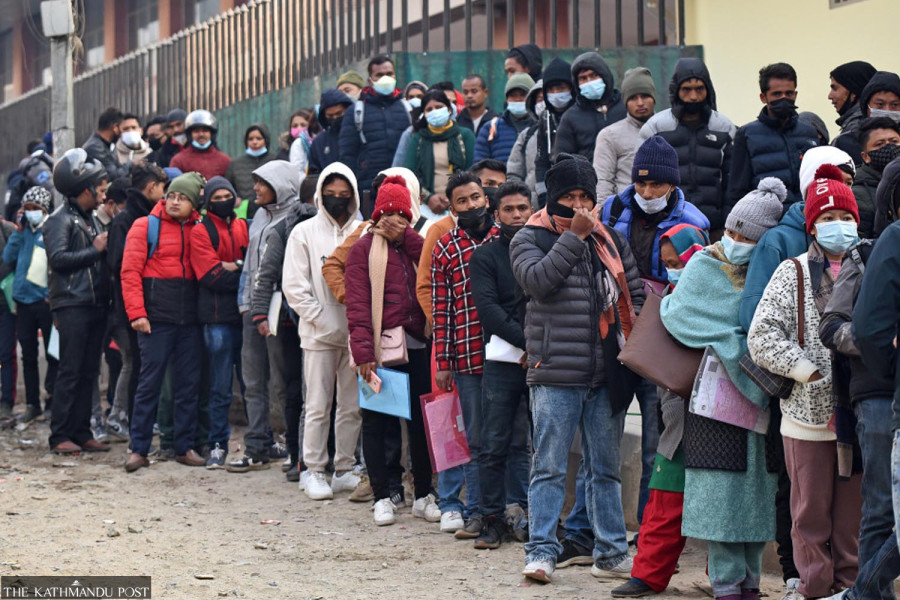National
Foreign minister joins the chorus in pledging to ease passport woes
Officials say the number of fresh passport books available with the department is depleting fast as 6,000 copies are printed daily.
Anil Giri
On Wednesday, newly-appointed Minister for Foreign Affairs Bimala Rai Paudyal held a meeting with senior officials of the Ministry of Foreign Affairs and the Department of Passports on how to ease the passport application and receiving process given that the number of service seekers at the passport department continues to increase.
After the formation of this government last month, Paudyal is the third leader to show serious concern about the passport distribution process.
Immediately after assuming office, Prime Minister Pushpa Kamal Dahal pledged to resolve the passport distribution problem, marking the issue as one of his top priorities. Then, Deputy Prime Minister and Home Minister Rabi Lamichhane came forward and pledged to resolve the matter.
However, there has been no substantive improvement in the situation.
Getting a passport from the department in Kathmandu is still an arduous task despite the intervention from the political level. It takes weeks and up to months to get a passport, if the service seeker applies from his or her district.
While assuming her office on Tuesday, Paudyal said that her priority will be to ease the service delivery by the foreign ministry. “So the crisis in passport distribution will obviously be on the top of my agenda.”
“She listened to our briefings seriously, where we told her about how the crisis emerged and how it can be resolved,” said an official at the Department of Passports. “After listening to our briefing, she said that the passport crisis was grave.”
According to the Department of Passports, their office daily receives, on average, 1,800 passports applications in Kathmandu alone, while it also receives applications from all 77 district administrations and Nepali missions abroad.
“We are printing around 6,000 passports on a daily basis which is a significantly high number,” said the director at the department of passports. “Among those who want to renew their passports are students pursuing higher education abroad and those going for foreign employment. Now even people travelling to India want passports to avoid the long queues at the Delhi airport.”
“Most people come seeking emergency passports from the department, so the crowd. If we can decentralise passport distribution, it will ease the burden. If we could, at the least, begin issuing emergency passports from all seven provinces, the crowds in Kathmandu would reduce. The second issue is if the government decentralises other services needed for foreign employment to the provincial headquarters, the crowds in Kathmandu will come down significantly,” the director added.
Officials say the number of fresh passport books available with the department is depleting fast. The government had signed an agreement with the France-based IDEMIA Identity and Security France SAS to provide two million passports and out of that, half the passports have already been distributed. The distribution of e-passports, also known as biometric passports, began in November last year.
The officials have already communicated to the Prime Minister’s Office and the Ministry of Foreign Affairs the problem of decreasing passports and mentioned to them the possible consequences, if the arrangement of new passports was not made as soon as possible,” another official at the department said.
Nepal had embarked from machine readable passports to e-passports last year.
Sewa Lamsal, the foreign ministry spokesperson, said at a regular briefing that the minister had stressed effective service delivery. The officials said Minister Paudyal did not immediately offer any idea to ease service delivery, but urged the officials to address the situation urgently.
Soon after the formation of the new government on December 25, Prime Minister Dahal had instructed senior bureaucrats, including Chief Secretary Shanker Das Bairagi, Foreign Secretary Bharat Raj Paudyal and Director General of the Department of Passports Surendra Kumar Yadav to ease the passport application and distribution process.
Soon after taking the oath of office, Deputy Prime Minister and Minister for Home Affairs Rabi Lamichhane also visited the department and discussed with officials ways to ease the passport distribution system as the people have to stand in long queues for hours just to submit the application form.
The Ministry of Home Affairs also set up and mobilised a panel of experts to study and recommend ways to resolve the hassles in public service delivery. The move is aimed at removing red tape in the distribution of essential documents such as passports, national identity cards and licences, for which people are compelled to stand in queues for hours.
“Lammichane had formed a technical team to fix the problem and those people were from his own team, not from the ministry,” said Home Ministry spokesperson Fanindra Mani Pokhrel. The team has probably submitted its report to the department, he added.
Director General Yadav said since the government has put service delivery on top of its priorities, they are hoping that the situation will improve soon. “The department also submitted a plan to ease the passport distribution system,” said Yadav.




 14.24°C Kathmandu
14.24°C Kathmandu















